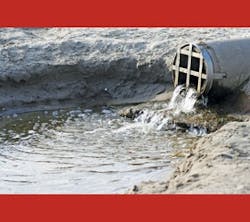The right software tools can help operations managers monitor data and respond to change more easily and efficiently. A U.S.-based excipient (nonactive tablet ingredients) manufacturer with international operations recently experienced this in its water discharge treatment process.
When the company’s township upgraded its treatment facility, it also changed the manufacturer’s permit and requirements for its wastewater discharge, forcing the business to re-examine its water discharge practices. Under the new provisions, the company is required to provide monthly reports of daily discharge levels, in addition to Cl and pH averages and minimums. Levels reported must be within township limits to meet compliance. The company could be fined for noncompliance if levels did not meet the new limits, so the factory needed to upgrade its systems.
Two Key Challenges
The company faced two challenges: a lack of intelligence in one area, and adequate data but no analysis in another. The water was monitored at the edge of the property through metering installed with chart recorders. The metering captured the necessary data for the monthly reports, but it was not easily accessible from the control room. This left managers unable to respond proactively to changing pH and Cl levels in the pretreatment process from remote locations.
Additionally, the existing monitoring systems acquired data using trends and recorded that data every two to five minutes. This added up to about 7 MB per day, which gave the operators enough data, but it was not easily accessible or interpretable by the managers.
Evaluating Potential System Upgrades
The company took several steps to evaluate potential system upgrades that would ensure compliance with the new limits. After speaking with a number of software providers, the company selected FactoryTalk applications from Rockwell Automation and contracted with system integrator EZSoft, a member of the Rockwell Automation PartnerNetwork program, to install the manufacturing intelligence solution.
EZSoft installed three FactoryTalk applications and integrated them with the existing system: AssetCentre asset management software, Historian data management software and VantagePoint EMI for data aggregation, analysis, remote visualization and reporting.
AssetCentre provides one directory for managing enterprise system security from a single location. Set parameters provide personnel access by predefined credentials. This redundant architecture provides the company with flexibility to expand the system in the future.
Historian collects and archives process variables within the pretreatment process. This information is fed into FactoryTalk VantagePoint EMI, which provides greater accessibility to correlated data in real-time tabular reports and time-series trending. This enables the company to analyze its data more immediately and efficiently create the connections that help it make the decisions important to its production process.
Results Oriented
The new system has helped people who work with the company’s water discharge treatment process. For example, the manager of the pretreatment process now has access to live plant data anytime from any Internet-enabled device. He can see tank levels, in addition to the past and current pH and Cl statuses, with simple graphical screens.
The environmental engineer can create monthly reports for the township more easily and efficiently with auto-populated data. She also has the ability to run discharge reports for past months and can complete all of her work at her desk. In addition, operators can reduce data entry time and diagnose upset conditions faster with automatic and more accurate metering.
The newly integrated infrastructure can grow within the factory and across the company’s global system of factories and technical service laboratories. At this factory, the water discharge issues have already gone from a few each year to zero.
The company plans to continue automating its data collection and expand deployments into other production facilities.
Download: Here


